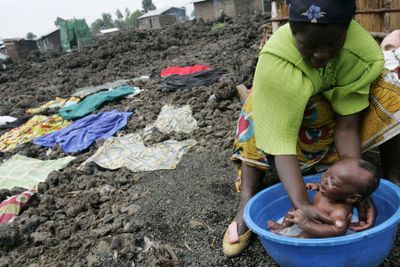Angola sending troops to ease violence in Congo
U.N. says departing Congolese soldiers are raping, pillaging

GOMA, Congo – Hundreds of Congolese soldiers rampaged through several villages in eastern Congo, raping women and pillaging homes as they pulled back ahead of a feared rebel advance, the U.N. reported Tuesday.
Meanwhile, neighboring Angola said it was mobilizing troops to send to Congo, though Angolan Deputy Foreign Minister Georges Chicoty did not specify how many or what their mission will be.
Southern African regional leaders meeting at a summit Sunday had discussed sending troops to reinforce the scattered Congolese army near Goma. The provincial capital has been besieged by rebels loyal to renegade Gen. Laurent Nkunda since he reached the outskirts.
The rebels have promised to fight any African troops that aid the Congolese army.
Chicoty made the announcement on Angolan national radio after attending a meeting in Brussels with European foreign ministers on Tuesday. He said the troops were going to Congo under the auspices of the Southern African Development Community and the European Union.
Reporters have already seen in the country Portuguese-speaking black soldiers wearing green berets with pins in the shape of a map of Angola. But the U.N. has said it did not have direct independent confirmation that Angolan troops were already in Congo.
The presence of Angolans in the volatile region could be seen as a provocation by neighboring Rwanda, raising tensions and fears that the fighting could spill beyond Congo’s borders.
U.N. peacekeeping spokesman Col. Jean-Paul Dietrich said the Congolese army troops had reportedly raped civilians near the town of Kanyabayonga in violent attacks that began overnight that lasted into Tuesday morning.
Kanyabayonga is 60 miles north of Goma.
Dietrich said 700 to 800 Congolese soldiers then fled Kanyabayonga and went on a rampage through several villages to the north.
“They looted vehicles, they looted some houses,” Dietrich said by telephone from Kinshasa, the national capital.
A rare nighttime gunbattle erupted late Tuesday between rebels and the army just north of Goma, and the U.N. said it was trying to get the warring sides to move farther apart. Mortars were also used during the nearly one-hour fight near Kibati, Dietrich said.
Kibati is six miles north of Goma and home to 75,000 people who have been repeatedly forced to flee fighting.
“There is a big tension because there are so many people there and it’s so close to Goma,” Dietrich said.
In New York, U.N. Secretary-General Ban Ki-moon called Tuesday for an immediate cease-fire so aid workers could urgently help “at least 100,000 refugees” cut off in rebel-held areas north of Goma.
The U.N. chief also said he was “very concerned by reports of targeted killings of civilians, looting and rape.”
Ban said about 3,000 more U.N. peacekeeping soldiers and police were urgently needed to bolster the 17,000-strong U.N. force in Congo that has been unable to stop the fighting or halt the rebel advance.
The U.N. Security Council was meeting Tuesday to take up Ban’s request.
Aid workers were trying to gain access to the towns of Rutshuru and Kiwanja, both 10 miles south of Kanyabayonga in rebel-held territory, where they expected the need for food was urgent.
In normal times, the two towns have a combined population of more than 150,000. But aid workers said they have no idea how many people are there now. At least 250,000 people have been displaced by 10 weeks of fighting between army troops and rebels led by Nkunda.
A rebel spokesman said any aid workers who wanted to help civilians trapped on rebel-held territory would be safe.
Congo’s armed forces are notoriously ill-disciplined soldiers, historically better at looting than standing their ground. In recent days, some have been seen manning checkpoints drunk.
Dietrich said the U.N. flew helicopters over the ravaged area Tuesday, carried out foot patrols, and initiated an investigation into the violence with the Congolese army.
The fighting in eastern Congo is fueled by ethnic hatred left over from the 1994 slaughter of at least 500,000 Tutsis in neighboring Rwanda. Nkunda says he is fighting to protect minority Tutsis from Rwandan Hutu militants who participated in the genocide before escaping to Congo.
A U.N. mission sent to Kiwanja, about 50 miles north of Goma, to investigate reports of civilian massacres there. It visited 11 burial sites that witnesses said contained 26 bodies of combatants and civilians, said Ban’s spokeswoman, Michele Montas.
New York-based Human Rights Watch said at least 50 civilians were killed there, mostly by rebels.
Closer to Goma, the situation for displaced refugees was dire.
“I haven’t eaten properly in three weeks,” said Teoneste Dies, 22. He fled his home three weeks ago with his wife and three children, surviving on whatever potatoes they could scrounge.
On Tuesday, he waited with thousands of others for food aid from the International Committee of the Red Cross.
In Kibati, about 70,000 people are living in makeshift camps. A long line snaked through town Tuesday morning as villagers picked up oil, maize flour, salt and beans.
Men were attempting to till a nearby field littered with volcanic rocks from an eruption in 2006.
“Normally they never try to plant there,” said Abdallah Togola, an aid worker. “It’s a big indication of how urgent the situation is.”
Relief officials say they have recorded at least 90 cholera cases around Goma since Friday. Seven more were admitted to a clinic in Kibati on Monday night.
The World Health Organization said Tuesday it fears a cholera epidemic could break out if the fighting continues and people continue to live in makeshift camps without proper sanitation. At least 1,000 cases of cholera have been detected since the start of October.